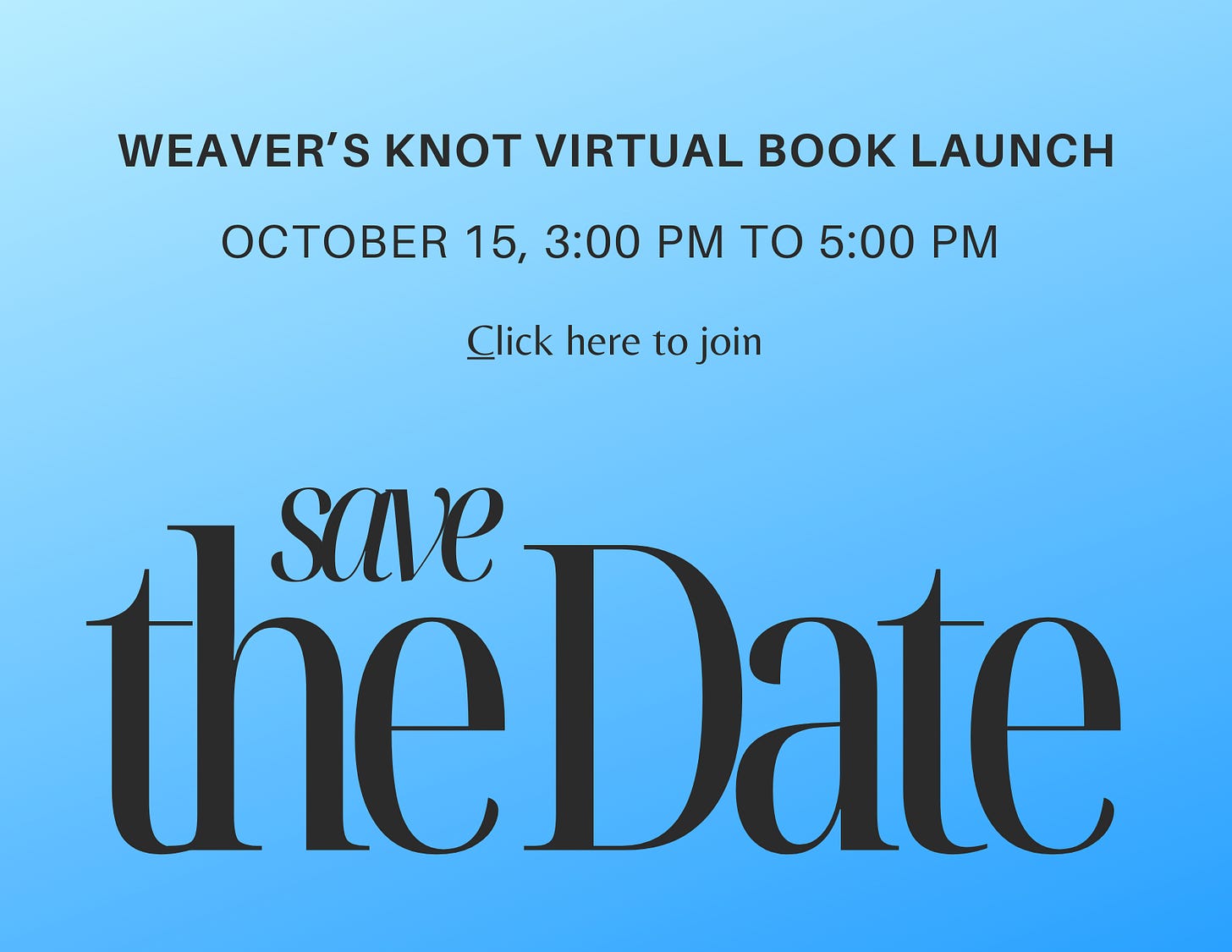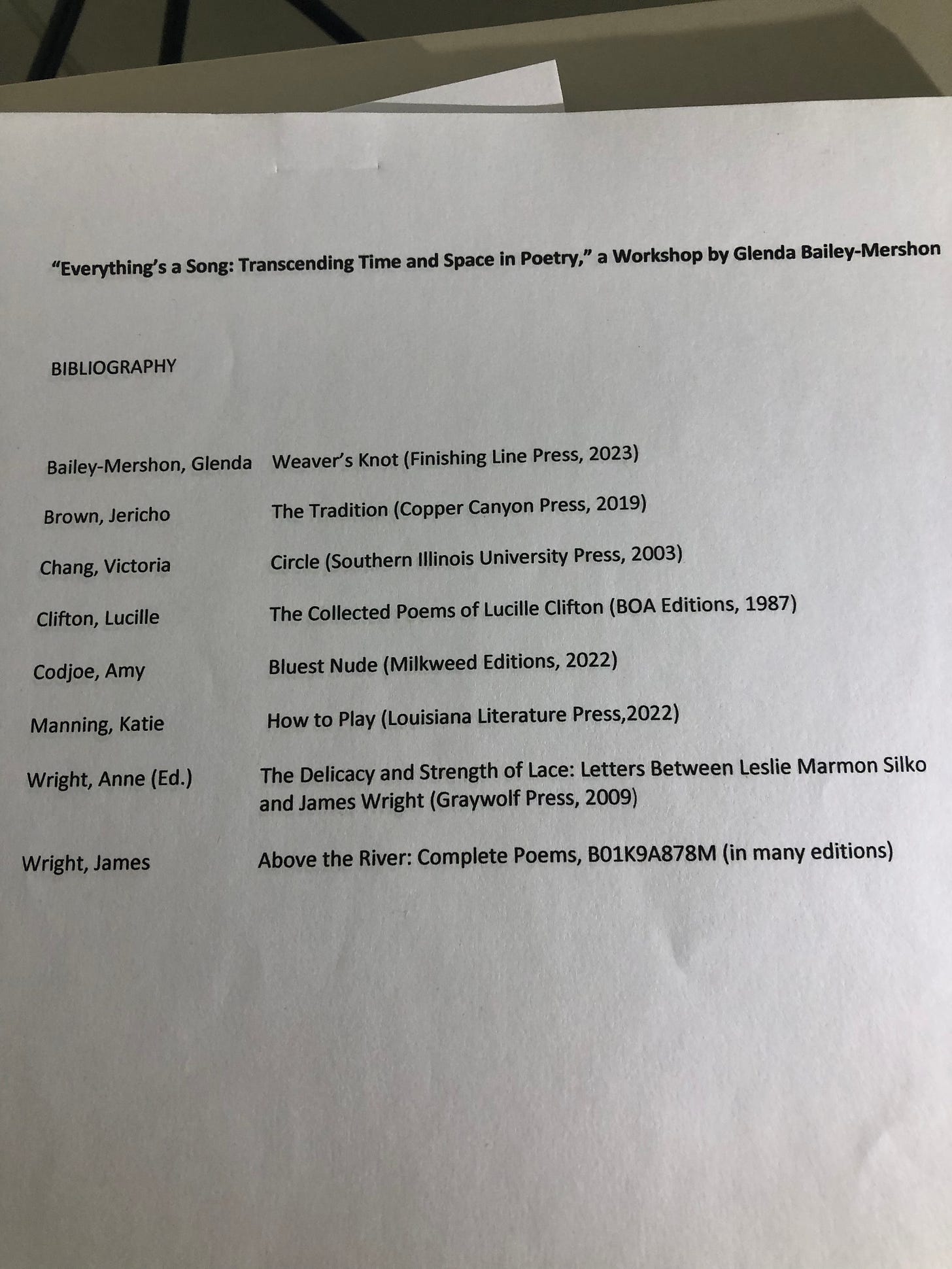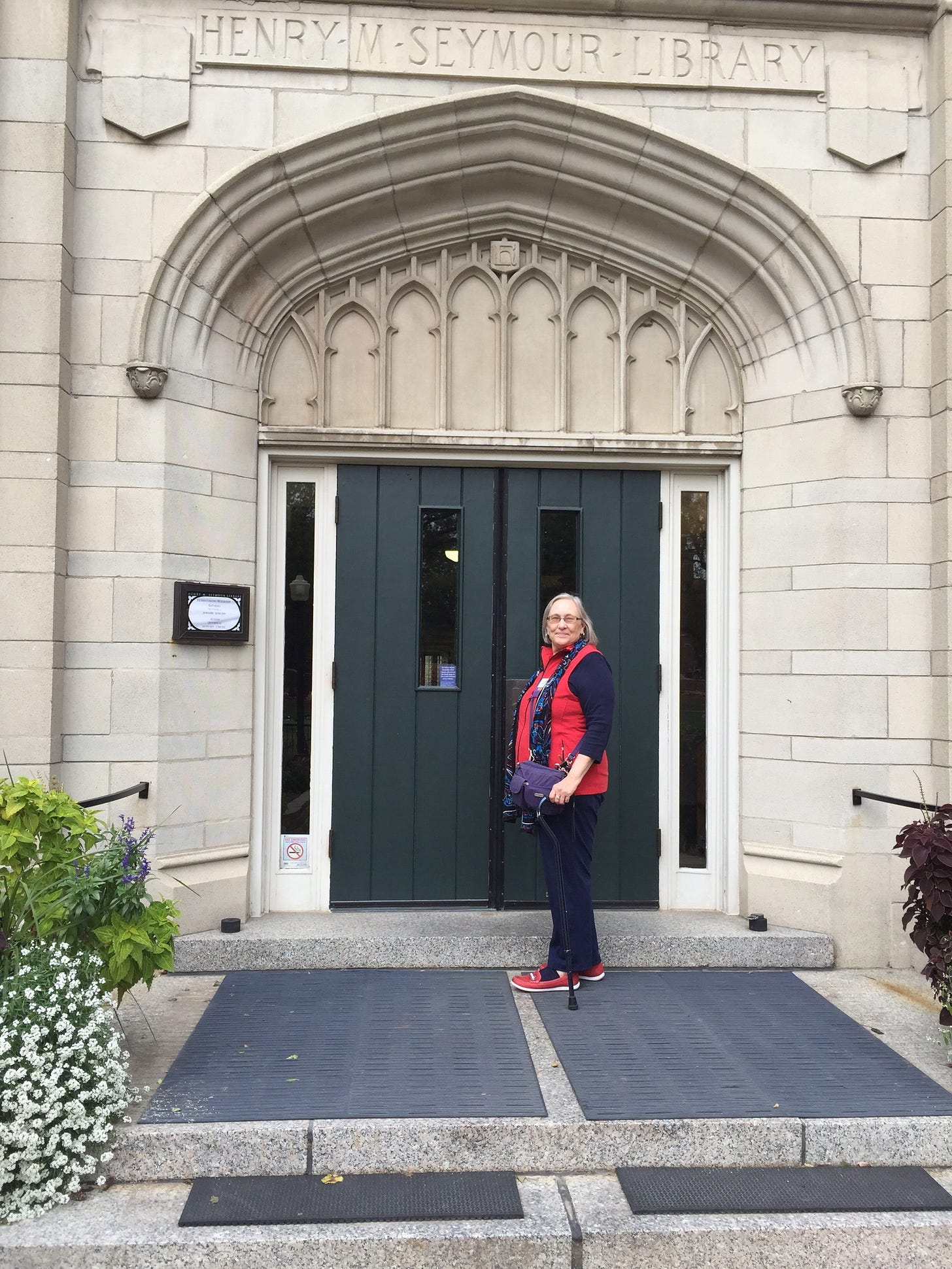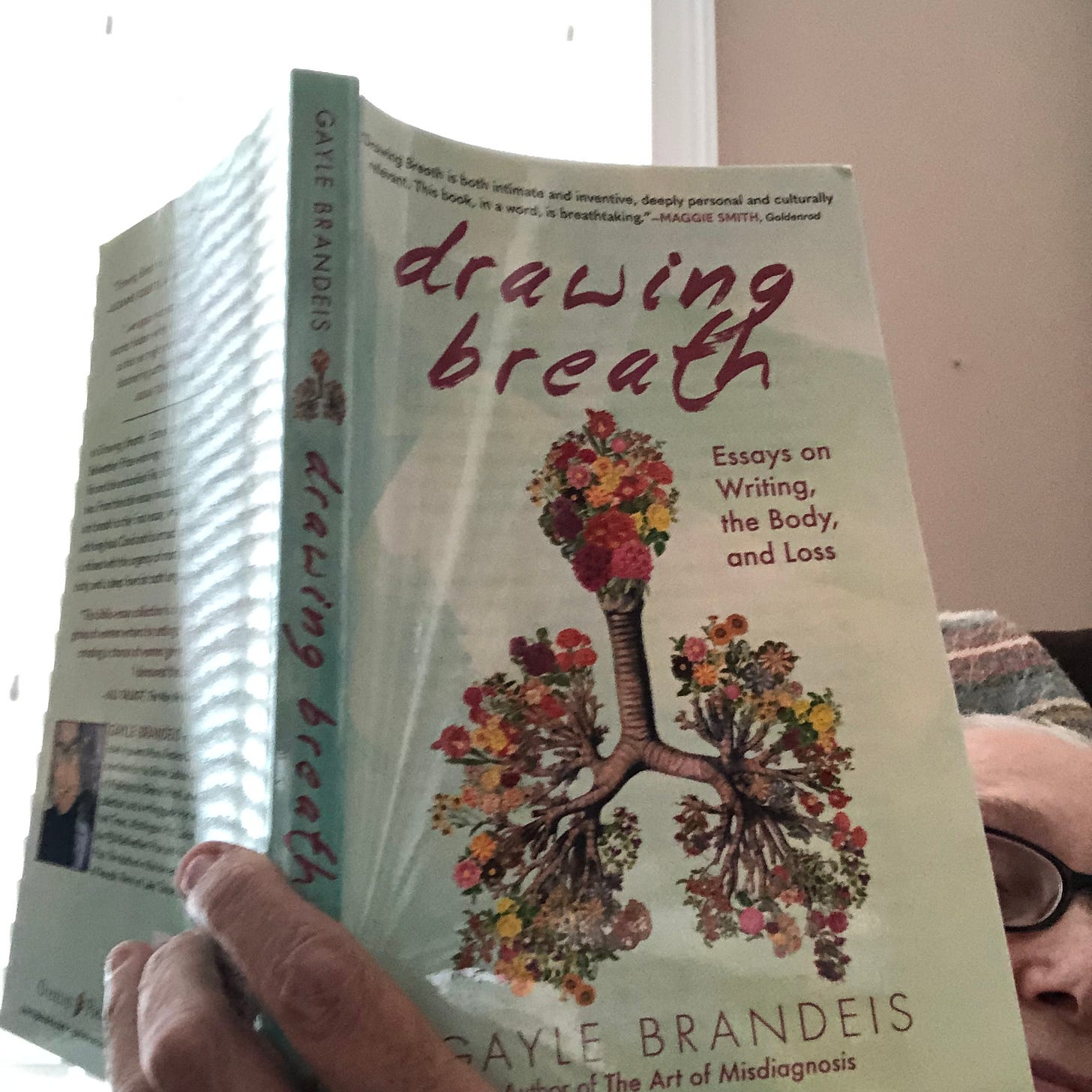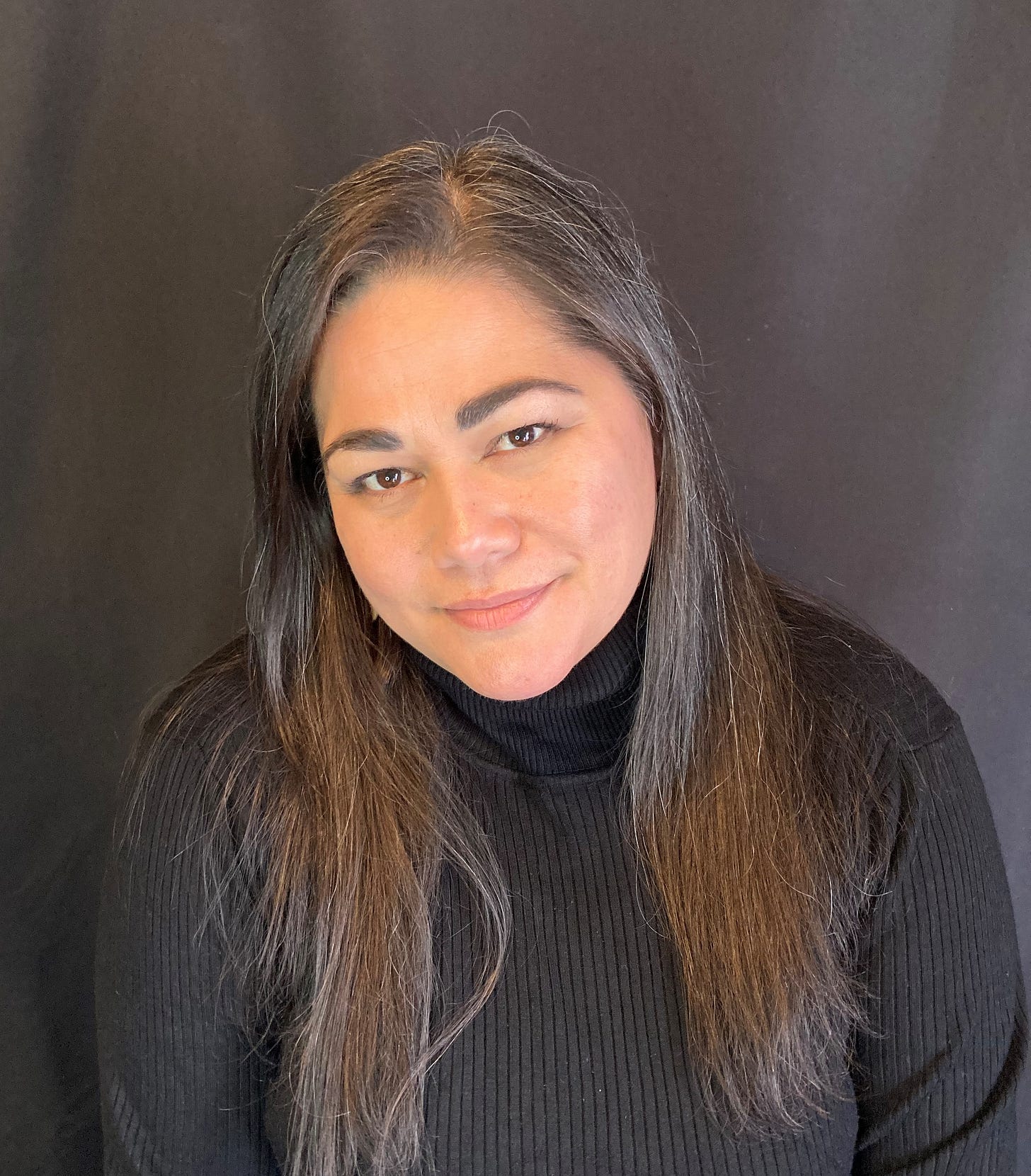Let’s talk about anticipation in writing.
Two weeks ago, I had a trial run for readings from the new book, Weaver’s Knot: Poems, when I offered a workshop on “Transcending Time and Space” for the St. Augustine PoetFest. I’m getting cheekier in my season of spice and wrinkles, so I did something I never would have thought of doing when I was younger: I added my own book to a list of venerable tomes on poetry and used it as a handout for the workshop. Here’s what that looked like, and I recommend highly all the books on this list:
Back to the point at hand—anticipation.
In the St. Augustine workshop, I read two poems from my new book, which the audience seemed to appreciate. Those poems were “Viney Parker’s Song” and “A Gypsy (Roma!) Poet Walks into a Coffeeshop.” The latter has elicited smiles and even laughter every time I’ve mentioned it. Those of you who know me know I am setting a scene with that title, a very knowing side-eye look at the prevalence of “Gypsies” in our popular culture. One person asked me as a joke if the poet in the poem was going to cast a spell on the audience: “Gypsies” are magical, right? If you know me, you can imagine that I turned that expectation and others on their ears on purpose, as a shibboleth against the view of “Gypsies” as “exotic.”
This is not unlike the way that Jericho Brown hoists up the flag pole some popular myths about police shootings of Black men, in “Bulletpoint,” the poem we read from his Pulitzer Prize winning volume, The Tradition. (Not that I am comparing my work to Jericho’s; he is a certified genius, and I believe he will become one of the most honored poets in our world.)
Both of these poems, mine and Jericho’s, are glued to a specific framework that is inimitable to our identities as poets and human beings—an example of the personal landscape that it is necessary for each poet to tease out from the body of their work. A branding, if you will, or, more cogently, a worldview only available from one vantage point, however wide the view afforded by that point. Our vantage point is our personal landscape.
This personal landscape almost certainly includes a place, or perhaps several places, that formed our identity. But it may also spin in and out, like one of those toy telescopes we had as kids, to include our intimates, and also, our “crowds.” So, for example, my intimates circle is fairly large, because I have a big extended family with whom I interact frequently, but it also includes the “crowds” of Parker High School graduates, Knox College friends and faculty, my colleagues at various universities, and, probably most life-alteringly, the feminists with whom I honed my teeth in politics. That telescope on my personal landscape is busy unfolding in and out, keeping up with and thinking about those people, those settings, those few places, all while I am writing and thinking about writing.
When we write from our personal landscape, we may speak most specifically to and for other people, but that landscape is a portion of the human scape attainable at least partially by anyone who accesses our work. And when we write consistently and directly from our own “piece of the sky,” we create expectations and, most desirably, anticipation in the hearts and minds of our readers. I am not Black-identified (despite a certain great-grandmother) but I want and need to know Jericho’s viewpoint on any subject he cares to write from, knowing that I will gain a worldview just a little wider than the one into which I was born. Similarly, I try to use my background as a mixed-ancestry child of poor, hard-working parents from Appalachia to illuminate social values and culture from a different vantagepoint.
A prime example of this anticipation of viewpoints not our own is the marvelous correspondence between James Wright, a then-already famous poet who was raised in industrial Ohio and had been a student athlete of some renown, and Leslie Marmon Silko, a member of the Pueblo Nation and a poet just then gathering the body of work that’s become iconic to Native American literature. Wright sought out the friendship after a chance meeting, and the correspondence grew in importance to each writer, even as it deepened into one of the most arresting examples of writers exploring each other’s world views. After Wright’s death, his widow, Anne Wright, published their correspondence as The Delicacy and Strength of Lace: Letters Between Leslie Marmon Silko and James Wright (Graywolf Press, 2009).
When we write, one of our goals is to build anticipation in our readers in ways that differ by genre. In fiction, both plot and character development should build to urgent need in the reader to understand both the climax and the denouement of the action. In nonfiction, plot can be an aid, but framing through use of time and concept can propel the reader through the work, as Gayle Brandeis does with her stunning new memoir, Drawing Breath: Essays on Writing, the Body, and Loss, using yoga breathing (pranayama) exercises to propel the reader through. It’s hard to explain how helpful this was, until you try it. I highly recommend her inspiring book.
In poetry, we often build anticipation though devices, including the title, but also through metaphor or simile, and through such structural elements as rhythm, the final “turning” in the last few lines, even through the white space as it frames the words. Poets, I have found, have a bag of tricks that is often under-appreciated.
In an even broader sense, all writers, whatever the genre, lead our readers to anticipate the next piece of writing by their assessment of the past writing. How we have made them feel is everything!
When I write a poem for you about my great-great-great grandmother, Viney Parker, I am writing to you about a persona who persisted across several centuries in her mountain homeland; it is a paean to being useful to her community, as I hope to be useful to our community here at The Inspiration Shelf. You’ll find the audio for that poem on this newsletter’s home page.
I write to build community. I hope that I have made you anxious for my next work, even for the next newsletter. I thank you for sticking with me thus far and for all the little notes, comments, and expressions you have offered in response.
Don’t forget to mark your calendars for the Virtual Launch on October 15–there will be recipes, special guests, music and FUN!
And I promised you some recipes for summer’s bounty. Look at these two recipes I found for ripe bell peppers—my favorites:
Sheet Pan Supper with Red Bells
Please continue letting me know what you think and how I’ve made you feel. Remember to click the heart above, and the share button. I would love to read your comments about any work that has built anticipation for you!
You may note that subscriptions have been turned on for this newsletter. I appreciate those of you who have subscribed either for free or as a donation.
At the bottom of this page, is one of my poems available just to you paid subscribers, and a special invitation to The Family Porch.
If you love this newsletter, get value out of it, believe in paying people for their work, and would like to join us on The Family Porch, consider a paid subscription.
My aim is to encourage community to get us all through the necessary loneliness of creating, writing, and navigating the publishing industry.
Other Folks We’re Following:
Melissa Llanes Brownlee (Reviewed: Kahi and Lua) has six new micros in the latest online iteration of The Rumpus.
https://therumpus.net/2023/04/24/rumpus-original-fiction-six-micro-stories/
Please, please, please preorder my book, if you haven’t already! Every publisher has a threshold on which promotion, distribution, and royalties to the author depend. I’m 50 copies away from that threshold. If everyone here buys one copy, we’ll make that goal, and give Weaver’s Knot a real chance out in the world.
I’m grateful to my press, Finishing Line, for creating the following graphic to help you order. It’s so easy—c’mon, why not treat yourself to a book that, according to its beta readers, sings, dances with joy, transcends generations, and invites readers into a lush landscape they won’t want to leave?
The special price is only available through July 21! And, if you message me your address, I will send you a signed bookplate so you’ll have an autographed copy!
Keep reading with a 7-day free trial
Subscribe to The Inspiration Shelf to keep reading this post and get 7 days of free access to the full post archives.



